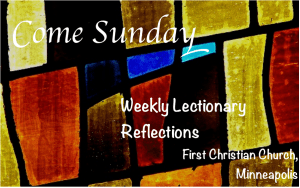Eleventh Sunday of Pentecost (Year C)
August 4, 2013
Luke 12:13-21
Here’s what I’ll do: I’ll tear down my barns and build bigger ones. Then I’ll gather in all my grain and goods, and I’ll say to myself, Self, you’ve done well! You’ve got it made and can now retire. Take it easy and have the time of your life!’
20 “Just then God showed up and said, ‘Fool! Tonight you die. And your barnful of goods—who gets it?
-Luke 12:18-20 (The Message)
 When I was a kid, I loved the fable of the Ant and the Grasshopper. The Ant was the serious type and worked hard to prepare for the coming winter. The Grasshopper was more of the free spirit who didn’t worry much about anything, especially the future.
When I was a kid, I loved the fable of the Ant and the Grasshopper. The Ant was the serious type and worked hard to prepare for the coming winter. The Grasshopper was more of the free spirit who didn’t worry much about anything, especially the future.
The story ends with winter arriving and the Ant all cozy in his modest two bedroom apartment. Meanwhile the Grasshopper is shivering in the biting winds, hungry and wondering what will happen to him.
I wanted to be that Ant. I wanted to prepare for the winter and I even remember telling my mother one morning as I was getting ready for school that we needed to prepare for the oncoming Michigan winter, just like the Ant.
In today’s passage, we see Jesus telling a story of his own. In this one the rich farmer ends up with a big harvest. He ends up building large barns to store his harvest and he then decides to kick back, relax and enjoy life, a little like that Ant in that children’s fable.
Except this time, God comes in and tells the farmer that he will die this evening and all of big earnings will be of no use to him.
In this tale, the Ant doesn’t fare so well.
What was wrong with the farmer? In one case, nothing. He had a big harvest on his hands. He had worked hard for this and wanted to enjoy it. It’s hard to see this guy as greedy; I mean he is just enjoying the fruit of his labor.
Maybe that’s why this story is so upsetting- because the farmer’s greed doesn’t look like greed. Most of us in his place would probably do the same thing and in fact, we do that all the time. We buy things telling ourselves that we need them and it doesn’t really look like we are being greedy-we’re just enjoying life.
Was the farmer greedy because he didn’t share what he had with others? The harvest ends up in the barns. What would have happened had he shared the harvest with others? What if we saw the bounty not as an occasion to pat ourselves on the back, but to be generous to others?
Jesus tells the story of the greedy farmer as the Message calls it, in response to a man who wants his bother to share their inheritance. Theologian Russell Rathburn notes that the man is probably the younger brother who in that time and place was entitled to a smaller share than his older brother. The younger brother wasn’t happy with what he had, he wanted more than his fair share. So Jesus then tells what has to be the first stewardship sermon.
As followers of Jesus, we are called to place everything at God’s feet and that includes our finances. We are called to be wise stewards. We are called to be generous with what we have. And we aren’t called to build bigger houses…I mean barns to store our stuff…or harvest.
In one version of the Ant and Grasshopper tale, the Grasshopper is left to freeze in the cold. Another version has the Ant taking the Grasshopper in and feeding his fellow insect. I’m going to guess that the first version is the “correct” version of the tale. But I kind of want to believe that the second version still has some validity, for the only reason to show that the wise Ant was not only supposed to be prudent, but also compassionate and generous.
Thanks the kind of Ant I want to be.
Go and be church.
More Resources
Here is what other scholars and pastors have to say about this week’s passage:
David Lose: What Money Can’t Buy
Carol Howard Merritt: Greed and Responsibility
Rick Morley: To Covet or Not




